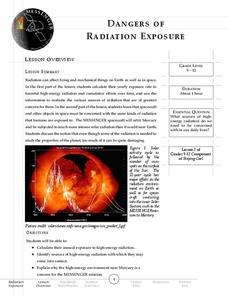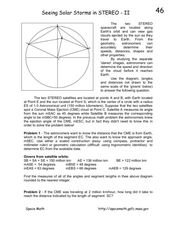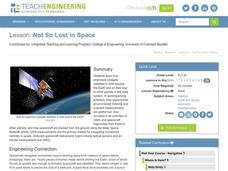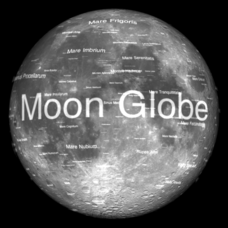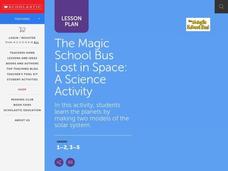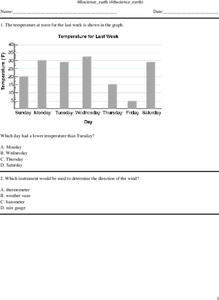University of Colorado
Happy Landings: A Splash or a Splat?
Huygens spacecraft landed on Saturn's moon Titan in 2005, making it the farthest landing from Earth ever made by a spacecraft. In this hands-on activity, the 12th installment of 22, groups explore how density affects speed. To do this,...
Messenger Education
Dangers of Radiation Exposure
Gamma radiation, which is harmful, is useful in treating cancers. In the second lesson in a series of four, young scientists take surveys and calculate their yearly exposure to ionizing radiation. Then they read about how harmful their...
Laboratory for Atmospheric and Space Physics
Looking to the Future
New Horizons set forth on a mission to Pluto in 2006. Ten years later, the spacecraft is still on its way. Here, enthusiastic scholars predict what they will be like—likes, dislikes, hobbies, etc.—when New Horizons arrives at its...
Curated OER
Mercury and Venus
Students learn about the characteristics of the planets Mercury and Venus. In this planets lesson, students learn about these planets and their differences from Earth. They also learn how the inventions of engineers have made it possible...
Curated OER
Early Space Missions
In this space missions instructional activity, learners read about the launch of the space shuttle Magellan and its exploration of Venus. Students complete 2 short answer questions based on the reading.
Curated OER
Seeing Solar Storms in STEREO-II
In this solar storms worksheet, students use a diagram given the location of two STEREO spacecraft satellites, a coronal mass ejection, the sun and the Earth to solve 2 problems about the coronal mass ejection. Students use segments,...
Curated OER
My Angle on Cooling
Students explore how the angle and distance of an object can change it's temperature. After reviewing how the position of the Earth affects the temperature of the planet, student groups design and perform an experiment to test how...
Curated OER
Technology for Studying Comets
Students design an Aerogel model to capture clay particles. In this space science lesson, students discover what happens to comets as they hit a surface. They explain how the Aerogel technology would help scientists study comets better.
Curated OER
Water on Planetary Surfaces
In this water on planetary surfaces instructional activity, students read about the Galileo spacecraft and the surface of Jupiter's moon Europa. They read about the energy needed to keep the water in a liquid state on Europa. Students...
University of Colorado
Distance = Rate x Time
Every year, the moon moves 3.8 cm farther from Earth. In the 11th part of 22, classes use the distance formula. They determine the distance to the moon based upon given data and then graph Galileo spacecraft data to determine its movement.
Curated OER
Not So Lost in Space
Students investigate how engineers navigate satellites in orbit around the Earth and on their way to other planets in the solar system. They study vocabulary words and participate in studying a satellite by learning about times and...
Midnight Martian
Moon Globe
Not just a simple globe of the moon, this interactive version allows you to choose lighting according to the location of the sun, views from different positions on Earth, and more! Satellite images and topographic data have been combined...
Curated OER
Food for Spaceflight
When astronauts get hungry in outer space, they can't just call and have a pizza delivered. In order to gain an appreciation for the challenges associated with space travel, young learners are given the task of selecting,...
Curated OER
The Earth, Sun Mood and Stars Unit (Planets too!)
Fifth graders prepare five activities to do then show their energy saving skills. In this investigative lesson students create five projects then participate in an energy saving demonstration.
Curated OER
The Magic School Bus Lost in Space
Students learn along with Ms. Frizzle's class. In this Magic School Bus lesson plan, students explore outer space as they visit the Sun, Mercury, Venus, and Mars in order to learn about our solar system.
Newspaper Association of America
Cereal Bowl Science and Other Investigations with the Newspaper
What do cereal, fog, and space shuttles have to do with newspapers? A collection of science investigations encourage critical thinking using connections to the various parts of the newspaper. Activities range from building origami seed...
Curated OER
People and Space
Students eat dehydrated foods that the astronauts would eat in space. In this dehydrated foods lesson plan, students make lists of food they could eat, discuss how dehydration takes place, eat food, and complete discussion questions.
Messenger Education
Mission: Possible—How Can We Plan an Exploration of Another World?
An astronaut's spacesuit weighs 280 pounds and takes 45 minutes to put on — that's a serious suit! The second activity of a three-part series allows pupils to see all that goes into space exploration. Through simulations, groups analyze...
American Museum of Natural History
A Closer Look at Mars
A website looks at how we know so much about Mars—telescopes, robots, and spacecraft—and the search for martian life. Following the informational text are three questions that quiz pupils about possible life on Mars.
Curated OER
The International Space Station-Follow that Graph!
In this altitude change of the International Space Station worksheet, students observe a graph of the change in altitude of the space station over time due to the Earth's drag. Students solve 3 problems using the data in the graph.
Curated OER
Navigation and Trajectory
Learners prepare a creative demonstration of how Earth and Mars revolve around the Sun. In this astronomy lesson, students determine the different challenges engineers face when building spacecrafts. They draw possible paths for a...
Curated OER
Earth Science
In this Earth science worksheet, 4th graders answer multiple choice questions about temperature, weather instruments, heat, light, and more. Students complete 25 questions.
Curated OER
To Boldly Go Where No One Has Gone Before
Students study pictures of space vehicles and make their own space vehicle. In this space vehicle lesson, students study pictures of the vehicles and compare and contrast the pictures. Students classify the space crafts and then create...
Curated OER
Artificial Satellites and Space Probes
In this satellites instructional activity, high schoolers match the list of facts given with the artificial satellite or space probe that it describes. This instructional activity has 12 matching questions.

